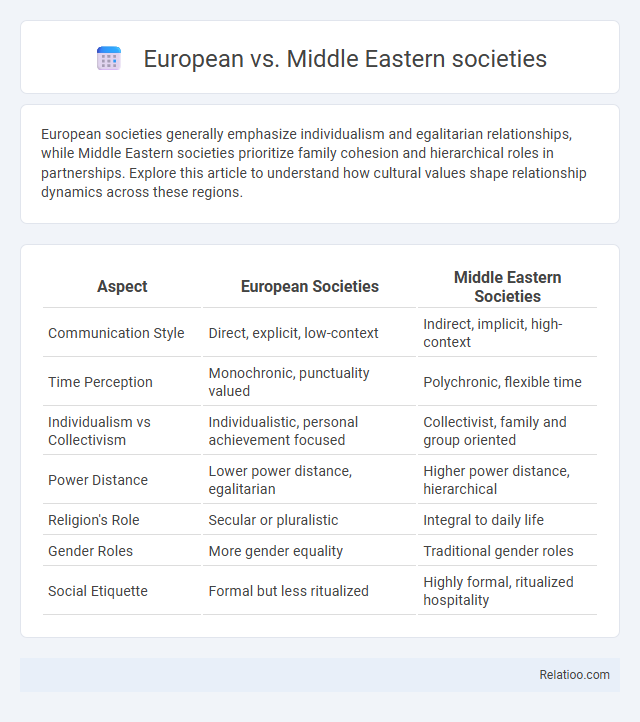European societies generally emphasize individualism and egalitarian relationships, while Middle Eastern societies prioritize family cohesion and hierarchical roles in partnerships. Explore this article to understand how cultural values shape relationship dynamics across these regions.
Table of Comparison
| Aspect | European Societies | Middle Eastern Societies |
|---|---|---|
| Communication Style | Direct, explicit, low-context | Indirect, implicit, high-context |
| Time Perception | Monochronic, punctuality valued | Polychronic, flexible time |
| Individualism vs Collectivism | Individualistic, personal achievement focused | Collectivist, family and group oriented |
| Power Distance | Lower power distance, egalitarian | Higher power distance, hierarchical |
| Religion's Role | Secular or pluralistic | Integral to daily life |
| Gender Roles | More gender equality | Traditional gender roles |
| Social Etiquette | Formal but less ritualized | Highly formal, ritualized hospitality |
Historical Evolution of European and Middle Eastern Societies
European societies have experienced a significant decline in divorce stigma since the Enlightenment, driven by shifts toward individual rights and secular legal systems that prioritize personal freedom. Middle Eastern societies maintain stronger divorce stigma due to deeply rooted religious doctrines and collectivist cultural traditions that emphasize family honor and social cohesion. Your understanding of these historical evolutions highlights how legal reforms and cultural values continue to shape societal attitudes toward divorce in both regions.
Cultural Values: Comparing Worldviews and Traditions
European societies generally emphasize individualism and personal fulfillment, leading to a more accepting attitude toward divorce and reduced stigma. Middle Eastern cultures often prioritize family cohesion and collective honor, resulting in stronger social pressures against divorce and higher stigma levels. Understanding these cultural values helps you appreciate the distinct worldviews that shape divorce perceptions in both regions.
Religion’s Influence on Society and Daily Life
Religious beliefs significantly shape attitudes toward divorce in European and Middle Eastern societies, with Middle Eastern communities often adhering to Islamic principles that emphasize marital permanence and family honor. In Europe, secularism and diverse religious influences contribute to more accepting views on divorce, reducing social stigma and allowing Your decisions to be more freely respected. Societal norms driven by religious doctrines in the Middle East maintain strong communal pressure against divorce, influencing daily life and social interactions extensively.
Family Structure and Social Dynamics
European societies often embrace nuclear family structures with increased acceptance of divorce, reflecting evolving social dynamics that emphasize individual autonomy and gender equality. In contrast, Middle Eastern societies typically uphold extended family systems where divorce stigma remains strong due to religious, cultural, and communal expectations that prioritize family honor and social cohesion. Your understanding of these contrasting family frameworks highlights how divorce impacts social standing and personal relationships differently across these regions.
Gender Roles and Expectations
European societies generally exhibit more progressive gender roles and expectations, leading to a lower stigma around divorce, especially for women seeking independence and equality. In contrast, Middle Eastern societies often maintain traditional gender roles that emphasize family honor and male authority, intensifying the social stigma attached to divorce and disproportionately affecting women's social standing. Understanding these cultural contexts can help You navigate and challenge the expectations surrounding divorce in diverse environments.
Education Systems and Approaches
European education systems tend to promote individualism and critical thinking, which contribute to more open attitudes towards divorce and reduced stigma in society. Middle Eastern education often emphasizes collective family values and religious teachings, reinforcing traditional views that discourage divorce and maintain social stigma. These contrasting educational approaches play a crucial role in shaping societal norms and influencing public perceptions of divorce in their respective regions.
Political Structures and Governance
European societies generally feature democratic political structures with robust legal protections for individual rights, which contribute to reducing the stigma around divorce and promoting gender equality. Middle Eastern societies often operate under more authoritarian or theocratic governance systems, where legal frameworks are heavily influenced by religious doctrines, maintaining strong social and political pressures against divorce. Your understanding of divorce stigma is thus shaped by how political institutions enforce cultural norms and laws, highlighting the critical role governance plays in either perpetuating or mitigating societal judgments on marital dissolution.
Economic Models and Employment Patterns
European societies tend to have more supportive economic models and social welfare systems that reduce the financial impact of divorce, promoting greater gender equality in employment patterns. Middle Eastern societies often emphasize extended family networks and traditional gender roles, creating economic dependencies that heighten the stigma surrounding divorce. Your ability to navigate employment opportunities is crucial in these contexts, as economic independence influences societal attitudes toward divorce and personal autonomy.
Arts, Cuisine, and Lifestyle Differences
European societies often embrace individualism, reflected in diverse arts scenes, eclectic cuisine, and liberal lifestyles that reduce divorce stigma. Middle Eastern cultures prioritize family unity and tradition, influencing conservative artistic expressions, rich regional cuisines, and lifestyle choices that stigmatize divorce more strongly. Your understanding of these contrasts can enhance cross-cultural appreciation of how arts, cuisine, and lifestyle intersect with societal attitudes toward divorce.
Modern Challenges and Opportunities for Integration
European societies generally exhibit lower divorce stigma due to progressive legal frameworks and social acceptance, fostering environments where Your right to individual choice is respected. Middle Eastern societies often face stronger divorce stigma rooted in traditional values and religious norms, posing modern challenges for individuals seeking separation. Opportunities for integration arise through cross-cultural dialogues and legal reforms aiming to balance respect for heritage with evolving social dynamics.

Infographic: European vs Middle Eastern societies
 relatioo.com
relatioo.com